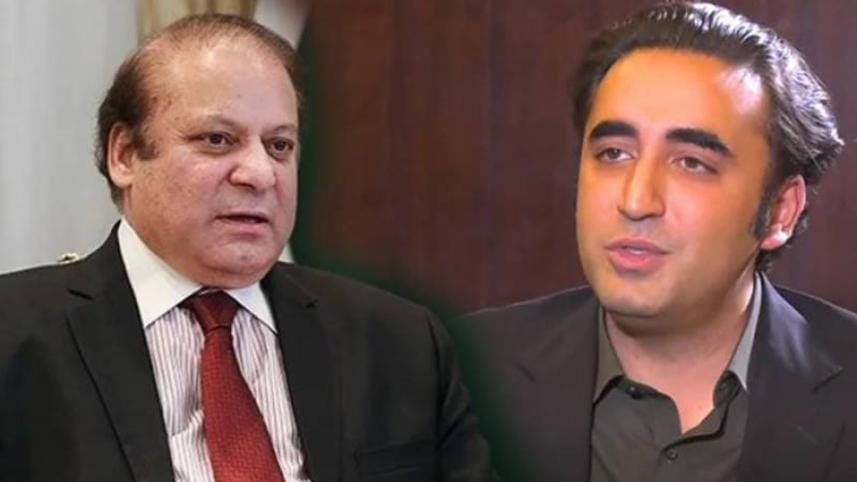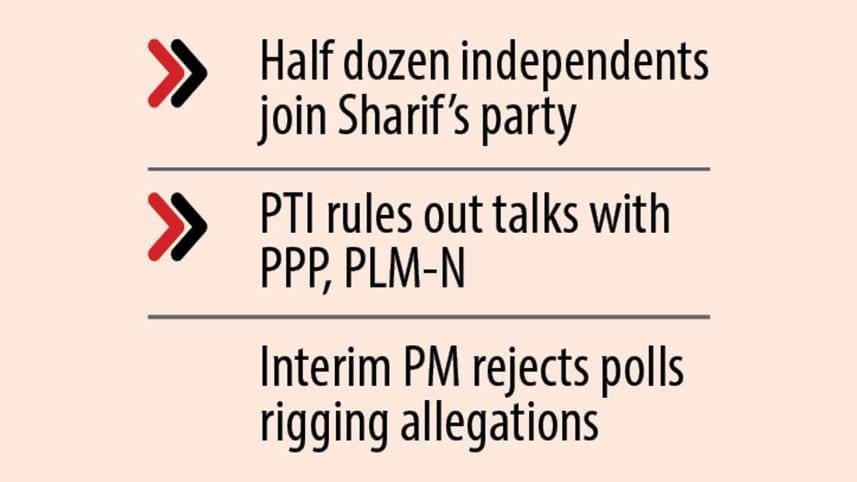Sharif, Bilawal eye Pak PM post

Political parties in Pakistan yesterday wrangled over terms and conditions of possible coalitions to form the next government after last week's election resulted in no clear winner.
Pakistani media yesterday said top leaders of Nawaz Sharif-led Pakistan Muslim League-Nawaz (PML-N) and Bilawal Bhutto Zardari-led Pakistan Peoples Party (PPP) met on Sunday and insiders in the meeting said the discussions focused on who would be the next prime minister.

The squabbling is likely to deepen concerns about the stability of the nuclear-armed nation which is mired in an economic crisis and battling a surge in militancy.
This flurry of political activities came as no party won a simple majority to form the next government in the polls. Imran Khan's Pakistan Tehreek-e-Insaf-backed independent candidates came out at the top with at least 93 seats, defying a months-long crackdown. PML-N and PPP respectively won 75 and 54 seats.
As Khan's independents ran as individuals, PML-N came out as the largest single party.
Imran and Sharif have both declared victory in the polls and both parties claimed the right to form the next government.
According to Dawn, PML-N, in the meeting, wanted to keep the slot of the prime minister and in return, it offered to the PPP the coveted slots of the president, National Assembly speaker, and the Senate chairman.
Geo News yesterday reported the parties also deliberated on the possibility of appointing prime ministers from their parties for a three- and two-year term under a power-sharing formula.
The PPP leaders said they would consult the proposals in meeting with the central executive committee.
Officials from both the PML-N and the PPP, however, said talks were snagged over which leader would take the top job.
"Both sides are interested in forming a coalition, but there is no breakthrough so far. Both parties want the office of prime minister," a top PML-N leader close to the Sharifs told Reuters.
Meanwhile, PTI yesterday said the party has decided, in principle, to ally or merge with "another political party" to claim the reserved seats, a key roadblock for the PTI in its attempts to claim a majority to form a government.
Speaking to Dawn, the PTI leader Barrister Gohar Ali Khan said that while they were exploring options in this regard, the party would definitely not be reaching out to either the PML-N or PPP for a possible alliance.
Meanwhile, Pakistani media reports yesterday said at least 6 independents, including one from PTI, have joined the PML-N.
A prime ministerial candidate has to show a simple majority of 169 seats in the 336-seat National Assembly when the house is called in the coming days.
Of these, 266 are filled by direct elections. Besides, the Pakistan constitution reserves 10 seats for religious minorities and 60 seats for women.
However, under Pakistan's electoral laws, independent candidates are not eligible for reserved seats, which are allotted according to the strength of each party in the house. Sharif's party could get up to 20 of these seats.
Khan-backed independents will only be able to claim the reserved seats if they can join a smaller party in parliament to form a single bloc.
PTI earlier claimed that the party won at least 170 seats. It has filed a slew of cases challenging alleged vote rigging in the election.
The PML-N has not named its prime ministerial candidate, but officials say the choice will be between Nawaz Sharif, 74, who was prime minister three times in the past, and his younger brother Shehbaz, 72, who held the post for 18 months until August last year.
The PPP has always maintained Bilawal Bhutto Zardari as its political scion, and if successful, the 35-year-old former foreign minister would become Pakistan's youngest premier since his mother Benazir was in office.
Meanwhile, Caretaker Prime Minister Anwaar-ul-Haq Kakar refuted the allegations of result manipulation and said that the election commission was not under any pressure to deliver a particular result.
He said Pakistan would not investigate allegations of election irregularities and delay in publishing results just because some foreign capitals had sought a probe and had its own laws to deal with any challenges.
The Election Commission of Pakistan blamed the mobile internet shutdown for the delay in publishing the results.



 For all latest news, follow The Daily Star's Google News channel.
For all latest news, follow The Daily Star's Google News channel.
Comments